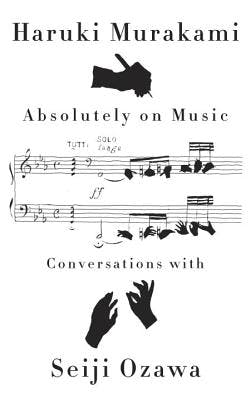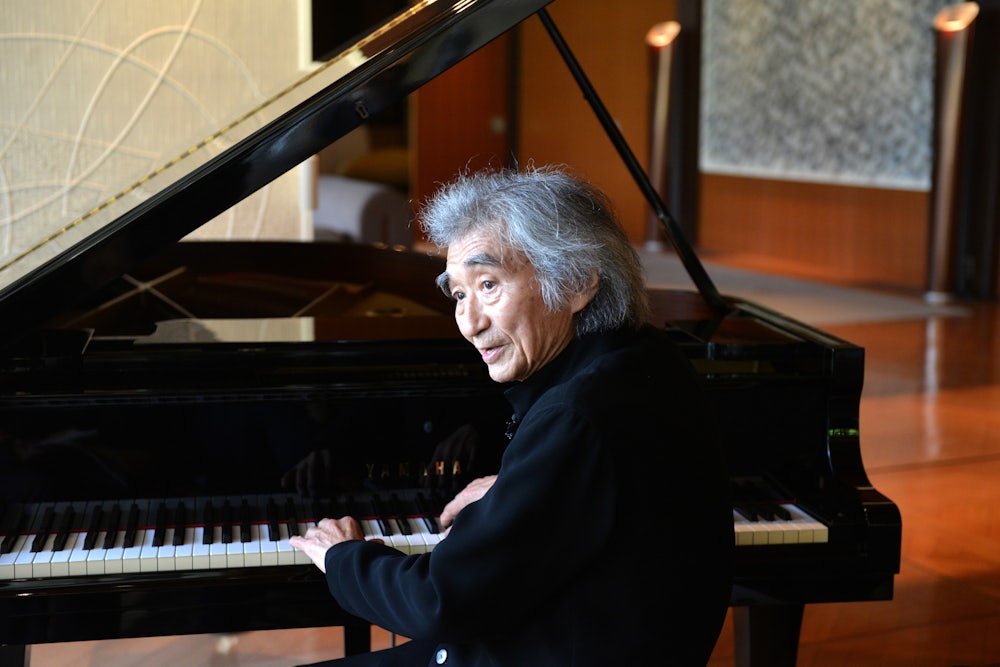In 1958, thirteen years after the end of World War II, the Japanese government still outlawed overseas tourist travel. Even for those lucky enough to get an outbound visa, plane tickets cost as much as a new car. Neither of these factors hampered the dreams of 23-year-old aspiring conductor Seiji Ozawa, who was determined to study in Europe. Nor did he listen to the vehement objections from his teacher and mentor, Hideo Saitō. To pay for his travels, Ozawa concocted a half-baked scheme to ride a Japanese motor scooter around France to win corporate sponsorship from the scooter’s manufacturer. Eventually, a wealthy classmate’s father stepped in to provide some starting funds, and Ozawa was off on a cargo ship for a three-week boat ride from Kobe to Marseille.
Ozawa’s ambitious plan paid off. In just two years, he took first place at the International Besançon Competition for Young Conductors and won a spot as legendary Austrian conductor Herbert von Karajan’s assistant. Ozawa moved to New York in 1961 to work under Leonard Bernstein, and from there began his emergence as one of the world’s most well-known conductors, spending nearly three decades at the Boston Symphony and eight years at the Vienna State Opera. Ozawa may have defied Japanese social norms to blaze his own path to success, but that success opened the door for further Japanese participation in the world of classical music.
When Ozawa became ill with esophageal cancer in 2010, his friend and best-selling novelist Haruki Murakami started to write down their conversations on music. The resulting book, Ozawa Seiji-san to, ongaku ni tsuite hanashi wo suru, was published in Japan in 2011, and now thanks to Murakami’s long-time translator Jay Rubin, the book is available to a broader audience in English as Absolutely on Music: Conversations.
Absolutely on Music is a fast-read of casual chats between Ozawa and Murakami meandering through various facets of classical music, from Ozawa’s own personal episodes working with famed conductors to more abstract themes like the influence of Mahler’s Jewish identity on his musical composition. The book shines as a deep exploration into how a conductor does his job and how performer personalities, logistical factors, and mundane bureaucracies can change an orchestra’s sound. Absolutely on Music is shop talk for the symphony set: How composers fall in and out of favor, how certain orchestra halls have the right echo for recording, how digital recording changed audience expectations, how musicians’ own familiarity with each other alters the sound. The book also dishes insider gossip on the greats: Leonard Bernstein is a anti-hierarchical mensch, while Glenn Gould is a fascinating “eccentric.” (Although Murakami has to leave a footnote that the best Gould stories were “too hot for print.”)
In recent years, Murakami may have become the more famous of the pair, but in good Japanese propriety, the younger author knows to act as the junior, humble interviewer. Fans of Murakami’s novels will enjoy the subtle ways in which he manages to insert his signature prose into transcripts of real-life dialogues.
Ozawa: Is it okay if I eat this o-nigiri rice ball?
Murakami: Please do. I’ll make tea.
I make tea.
Murakami, however, is a much more aggressive protagonist than his own novels’ characters, always pushing the anti-dogmatic Ozawa to arrive at concrete conclusions.

For Ozawa’s stature as an old maestro, he remains humble about his success, and this underdog persona makes him an ideal vessel for taking ourselves inside the world of classical music. Ozawa entered the field as a true outsider: His father was a dentist-turned-politician in the Japanese puppet state of Manchukuo, and his Christian mother stoked a love of music through teaching the hymnal and letting him learn piano at a time when the instrument was both a rare luxury and almost exclusively taught to young women. Ozawa only decided to become a conductor after seeing Leonid Kreutzer in Tokyo conduct a symphony while playing piano. He spent the next several years under the intense tutelage of his German-educated teacher, Hideo Saitō. When he showed up in Europe, he had few friends or francs but enough talent and confidence to win competition after competition.
But his nationality still kept Ozawa an outsider, even as assistant conductor of the New York Philharmonic. “My English was so bad,” he admits, “I hardly knew what was going on.” His prestigious assignments did not translate into living wages; his crummy apartment in New York was so hot in the summer that he and his wife would sleep in all-night movie theaters, waking up every two hours after a film ended. Fortunately for the reader, Ozawa’s humility extends to admitting professional failures, and in these we learn more about where orchestras go wrong. Listening to old recordings with Murakami, Ozawa is quick to point out where the orchestra isn’t “breathing together” or explain why exactly the Boston Symphony is “doing a bad thing to Brahms.”
Murakami could be seen as the literary equivalent of Ozawa—a man who became world-famous for his mastery of a Western art form. The two share similar backgrounds in the Japanese context as well: The product of highly educated families, early exposure to Western culture in the home, an obstinate pursuit of non-conformist paths. (Murakami, at 25, borrowed money from his wife’s parents to open a jazz café in the Tokyo suburbs.) But the 14 years between their births map exactly to Japan’s Economic Miracle: Ozawa grew up in the bitter postwar years and left the country before prosperity, and Murakami was a Baby Boomer who spent six years in college when Japan was the second biggest economy in the Free World. They both love music, but their generation gap has given them completely different ideas of what that means.
Ozawa defends music as a pure art form—divorced from commerce, social signifiers, and even rigid theory. He tells Murakami, “When I study a piece of music, I concentrate fairly deeply on the score. And the more I concentrate, probably, the less I think about other things. I just think about the music itself.” He sees his role as conductor as “to convert the music exactly as it’s written into actual sound.” After failing to understand Austrian composer Alban Berg’s opera Wozzeck, he did not listen to records but “started rereading the score from scratch. And that’s when I got it. I had understood the ‘language’ of the music well enough when I was just reading the score—what the music was trying to say.”
Throughout the book, Murakami bates Ozawa with questions on how his Japanese background affects his interpretation of the music, but Ozawa sticks to universalism. He is pushed to admit that “We Japanese and other Asian people have our own special kind of sorrow,” but he dismisses the idea that music is a proprietary form exclusive to a particular nationality. Ozawa complains, “Everyone says that enka is unique to Japan, a form of music that only Japanese can sing and only Japanese can understand. But I don’t believe it. Basically, enka comes from Western music, and it can be fully explained using Western music’s five-line musical staff.”
If Ozawa represents music as a pure artistic expression, Murakami represents music within the consumerist explosion of the late 20th century. Murakami is a music obsessive, but he is focused on recordings and all their auxiliary information. Early in the book, Ozawa warns Murakami: “Now, you might find this a little offensive, but I’ve never liked those manic record collectors—people with lots of money, superb music reproduction equipment, and tons of records.
Murakami spends the entirety of Absolutely on Music living up to the epithet. The author opens the book with the confession, “I never received a formal musical education, have virtually no technical knowledge of the field, and am a complete layman where most things musical are concerned” but then appears to know everything about every recording in history. On a dime, Murakami can accurately complete Ozawa’s vague description of “that handsome American fellow who died young” as conductor Thomas Schippers, and he seemingly owns more Ozawa recordings than Ozawa. In perhaps the best moment of Murakami’s laid-back erudition, he says about a Mahler symphony, “I seem to recall that the movement is labeled ‘Feierlich und gemessen, ohne zu schleppen,’ which translates as ‘Solemnly and measured, without dragging.’” When it comes to notes on a page, Murakami may know little, but when it comes to records, he knows all. Ozawa writes in the afterward, “I have lots of friends who love music, but Haruki takes it way beyond the bounds of sanity.” These diverging approaches to music reveal how culture in the last half-century has transformed from a hallowed, intellectual pursuit—learning instruments, symphony attendance, “musical appreciation”—to an often solitary one that focuses around the primacy of actual media—record collecting, trivia, and “cratedigging.”
More importantly, the two different views illuminates how exactly Japanese outsiders have been able to break into once exclusively Western artistic communities. Neither Ozawa nor Murakami link themselves to Japanese traditions in the manner of writer Yukio Mishima or composer Toru Takemitsu. But where Ozawa reduced his art down to pure musical forms to find an opening—like an Olympic athlete competing on innate talent—Murakami rose to fame in part through beating Westerners at their own post-modern game of subtle pop culture reference and tasteful signifiers. Murakami’s novels indulge readers in an exaggerated cosmopolitan Tokyo where characters listen to an impeccably selected jazz soundtrack, wear Paul Stuart suits, and speak like Raymond Carver characters. And as Japan’s consumer economy exploded in the 1980s, Murakami could arguably do this better by staying in his home country than going abroad.
While Ozawa’s approach was perhaps the most obvious strategy for overseas success in the early post-war, this meritocratic path is now so pedestrian it hardly gives Japanese artists an edge. Western audiences today look to Japanese artists for not just competence but a uniquely hyper-concentrated version of their own culture. This includes popular musicians Pizzicato Five and Cornelius’s recreations of obscure 1960s exotica sounds, Japanese denim companies’ reproductions of moribund dyeing, yarn spinning, and weaving techniques to create high-quality jeans, and even Suntory’s Yamazaki, a single malt in more demand than what is coming out of Scotland. In reading Absolutely on Music, we are taken aback by Murakami’s encyclopedic knowledge about classical music but hardly surprised: Japan is no longer a land of hard-scrabble upstarts like Ozawa, but ground zero for obsessive approaches to Western culture.
In Absolutely on Music, Ozawa shares enough wisdom to help cement his legacy as one of the most important and talented conductors of his age, but to contemporary readers, his purist approach to music may feel quaint. Murakami is reverent to the old conductor throughout the interviews, but it is surely Murakami and the others of his generation who have not just achieved fame inside and outside Japan but showed what the world truly wants from Japan.
